The AMD Radeon VII Review: An Unexpected Shot At The High-End
by Nate Oh on February 7, 2019 9:00 AM ESTCompute Performance
Shifting gears, we'll look at the compute aspects of the Radeon VII. Though it is fundamentally similar to first generation Vega, there has been an emphasis on improved compute for Vega 20, and we may see it here.
Beginning with CompuBench 2.0, the latest iteration of Kishonti's GPU compute benchmark suite offers a wide array of different practical compute workloads, and we’ve decided to focus on level set segmentation, optical flow modeling, and N-Body physics simulations.
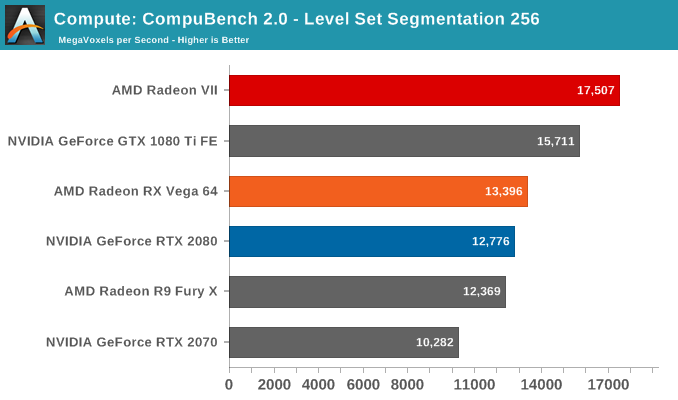
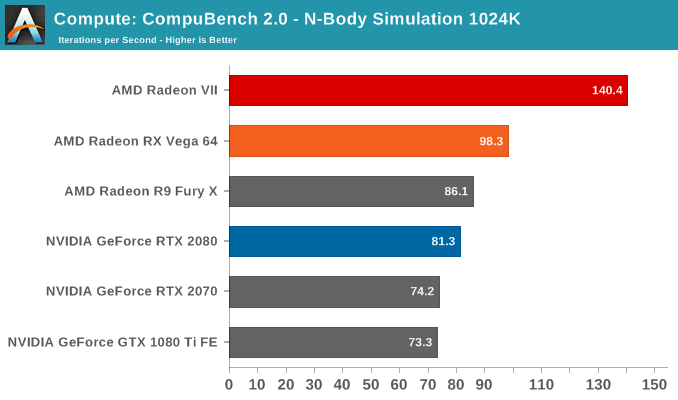
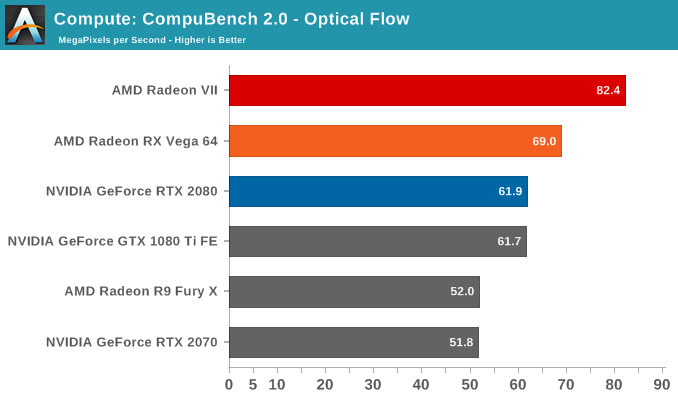
Moving on, we'll also look at single precision floating point performance with FAHBench, the official Folding @ Home benchmark. Folding @ Home is the popular Stanford-backed research and distributed computing initiative that has work distributed to millions of volunteer computers over the internet, each of which is responsible for a tiny slice of a protein folding simulation. FAHBench can test both single precision and double precision floating point performance, with single precision being the most useful metric for most consumer cards due to their low double precision performance.
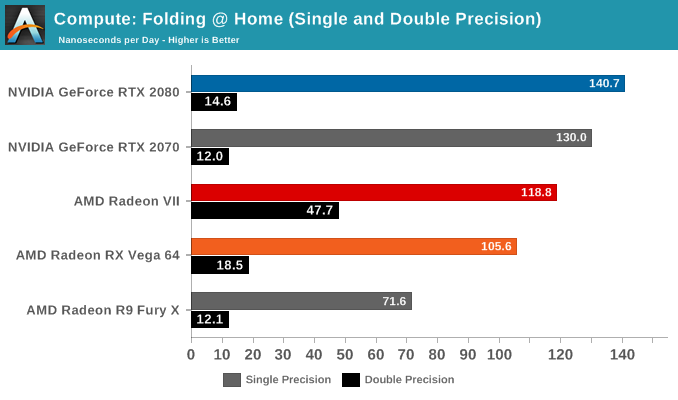
Next is Geekbench 4's GPU compute suite. A multi-faceted test suite, Geekbench 4 runs seven different GPU sub-tests, ranging from face detection to FFTs, and then averages out their scores via their geometric mean. As a result Geekbench 4 isn't testing any one workload, but rather is an average of many different basic workloads.
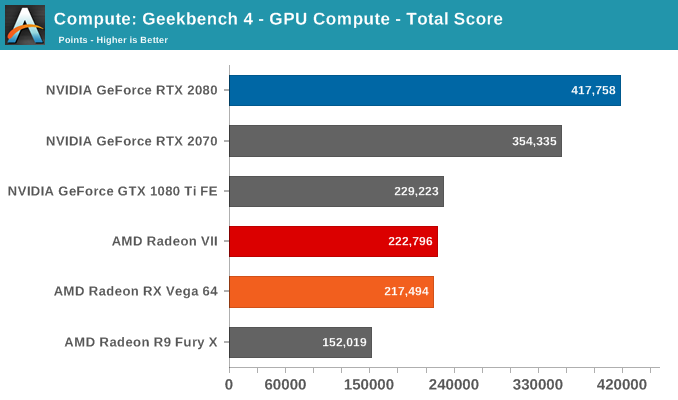
Lastly, we have SiSoftware Sandra, with general compute benchmarks at different precisions.
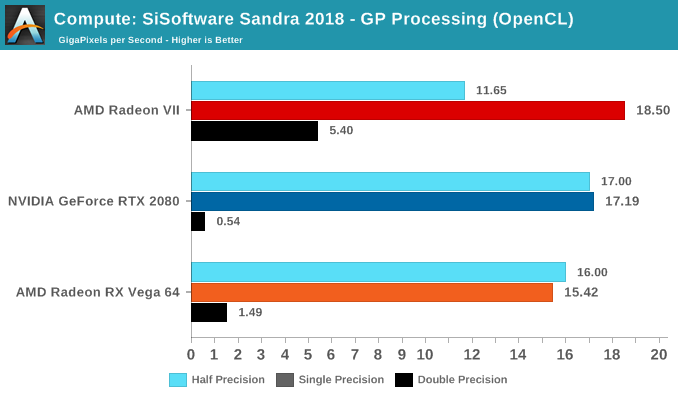
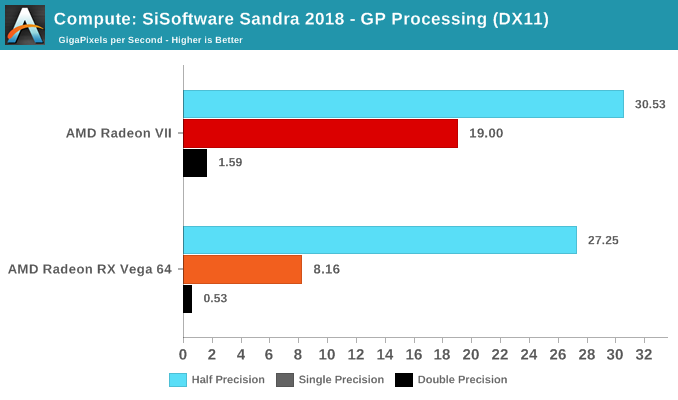
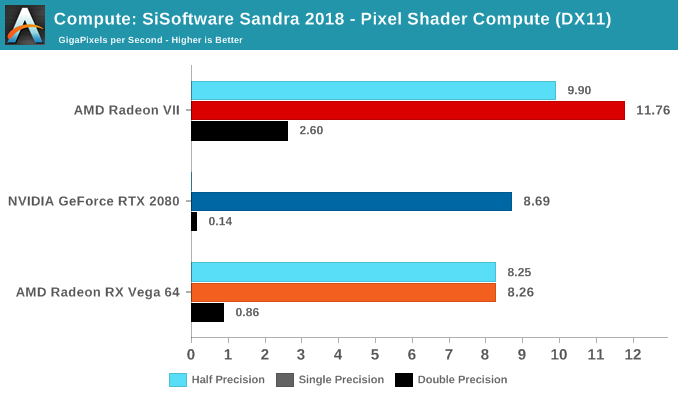










289 Comments
View All Comments
just4U - Thursday, February 7, 2019 - link
Really? I see the pre-order pricing here in Canada as 50-100 less then the 2080.Oxford Guy - Thursday, February 7, 2019 - link
I think you missed the noise-to-performance metric.This GPU isn't even close to competitive with the 2080 because of that.
just4U - Friday, February 8, 2019 - link
Sure it is.. a mild undervolt (which the cards support in wattman) is all that's needed. Lower temps lower fan noise. (..shrug)Also since many own blower style cards these 3 fan designs are usually less noise (unless maybe coil whine comes into play..)
Oxford Guy - Friday, February 8, 2019 - link
1) Undervolting is a crap shoot due to binning and other factors, not a solution that you can simply apply as a fix for every one of these cards.2) Saying that some other cards are even louder is a complete avoidance of the issue. The issue is that Nvidia is crushing the noise-to-performance metric with the 2080, according to the presented data in this article. AMD is not, at all, competitive.
eva02langley - Friday, February 8, 2019 - link
Results are there and Vega is greatly improved with undervolting. It is like this since it launch. It is related to the uarch.D. Lister - Friday, February 8, 2019 - link
Which is why I can never recommend AMD GPUs. I mean how competent can they really be if they don't even know how to set proper voltages on their GPUs?Oxford Guy - Friday, February 8, 2019 - link
It's also possible that a GPU will run at a lower voltage that what is optimal without artifacting and yet perform more slowly. Chips are typically able to do some compensation with error correction to handle inadequate voltage but the result is reduced speed.Oxford Guy - Friday, February 8, 2019 - link
You're avoiding the point.eddman - Thursday, February 7, 2019 - link
It's performing better than I expected. It doesn't fully match a 2080 but still performs good enough as a stopgap solution.A bit lower price would've been nice but I suppose it can be justified by the 16GB memory to some extent.
Oxford Guy - Thursday, February 7, 2019 - link
"It doesn't fully match a 2080 but still performs good enough as a stopgap solution."No. It sucks unless you can use the areas of compute it excels at.
There is zero reason to buy a product for gaming that is so much louder for equivalent gaming performance. None.